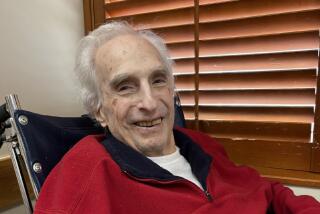Deborah Raffin dies at 59; actress was also a force in audio books
Deborah Raffin, a film actress, veteran of television miniseries and entrepreneur whose company, Dove Books-on-Tape, became a major force in the audio book industry, died Wednesday of leukemia at the Ronald Reagan UCLA Medical Center. She was 59.
She was diagnosed with the blood cancer about a year ago, said her brother, William.
The blond, California-born actress first came to attention in the mid-1970s playing “pretty girl” roles in movies such as “Forty Carats” with Liv Ullman and “Once Is Not Enough,” based on the salacious novel by Jacqueline Susann.
PHOTOS: Notable deaths of 2012
She later tackled more substantial parts in television miniseries, playing legendary actress Brooke Hayward in “Haywire” (1980) and a businesswoman in “Noble House” (1988), based on the James Clavell saga of love and intrigue in Hong Kong.
In the mid-1980s, she and her then-husband, Michael Viner, launched Dove as a hobby in the garage of their Coldwater Canyon home, but it blossomed into a multimillion-dollar business with a mix of high- and low-brow titles, from Sidney Sheldon’s bestseller “The Naked Face” to physicist Stephen W. Hawking’s opus on the cosmos, “A Brief History of Time,” which was Dove’s first bestseller.
“I enjoy acting,” Raffin told the Riverside Press-Enterprise in 1996, “but I’ve never been driven to just act. I’ve always had a desire to produce, to be in control of my own destiny, to be able to find material and develop it.”
The daughter of Trudy Marshall, a contract player at 20th Century Fox in the 1940s, and Philip Raffin, a meat broker and restaurateur, she was born in Los Angeles on March 13, 1953, and grew up in Beverly Hills and Bel-Air. After graduating from University High School, she attended L.A. Valley College and was in her second year there when she was discovered in an elevator by a talent agent.
She met Viner, a music producer, on a blind date in 1974 and married him four months later. They launched Dove Books-on-Tape in 1985 and later expanded in book publishing and movie and television production.
The books-on-tape venture had its origins in a backgammon game in which novelist Sidney Sheldon had lost $8,000 to Viner. Viner did not want to take the money and arranged instead to produce two of Sheldon’s bestsellers as audio books. The name of the company was inspired by Raffin’s 1974 film “The Dove,” which was her second movie and co-starred Joseph Bottoms.
Her job in the audio books company was lining up performers such as Burt Reynolds, Elliott Gould, Roger Moore and Ruby Dee. Among the first tapes she and her husband produced were “Anatomy of an Illness” and “The Healing Heart,” the nonfiction bestsellers by their neighbor Norman Cousins. They were read by Jason Robards Jr. and William Conrad.
Raffin also compiled celebrities’ Christmas anecdotes for a 1990 book, “Sharing Christmas,” which raised money for groups serving the homeless. It included stories from Margaret Thatcher, Kermit the Frog and Mother Teresa, whose contribution Raffin obtained by traveling to the Nobel Prize winner’s mission in Calcutta.
Raffin and Viner sold the company in 1997 after some ill-timed expansion efforts and controversies stemming from some of the more sensational book projects favored by Viner. These included two books by figures in the O.J. Simpson murder case, including Faye Resnick’s “Nicole Brown Simpson: The Diary of a Life Interrupted” (1994).
Raffin’s marriage to Viner ended in divorce in 2005. (He died of cancer in 2009.) In addition to her brother, William, of Malibu, Raffin is survived by a sister, Judy Holston, and a daughter, Taylor Rose Viner, both of Brentwood.
Services will be held at 1 p.m. Sunday at Hillside Memorial Park in Culver City.
Through Dove, Raffin and Viner also promoted American movies in China, where the actress was a major star thanks to the popularity there of her early TV movie “Nightmare in Badham County” (1976), an exploitation flick about two coeds whose car breaks down in a small Southern town.
On a visit to the country in the early 1980s, Raffin’s Chinese fans reacted to her by pointing and shouting “nightmare, nightmare, nightmare.”
“It’s funny now,” she told the Orange County Register in 1988, “but it wasn’t funny then.”
More to Read
Start your day right
Sign up for Essential California for the L.A. Times biggest news, features and recommendations in your inbox six days a week.
You may occasionally receive promotional content from the Los Angeles Times.




















































